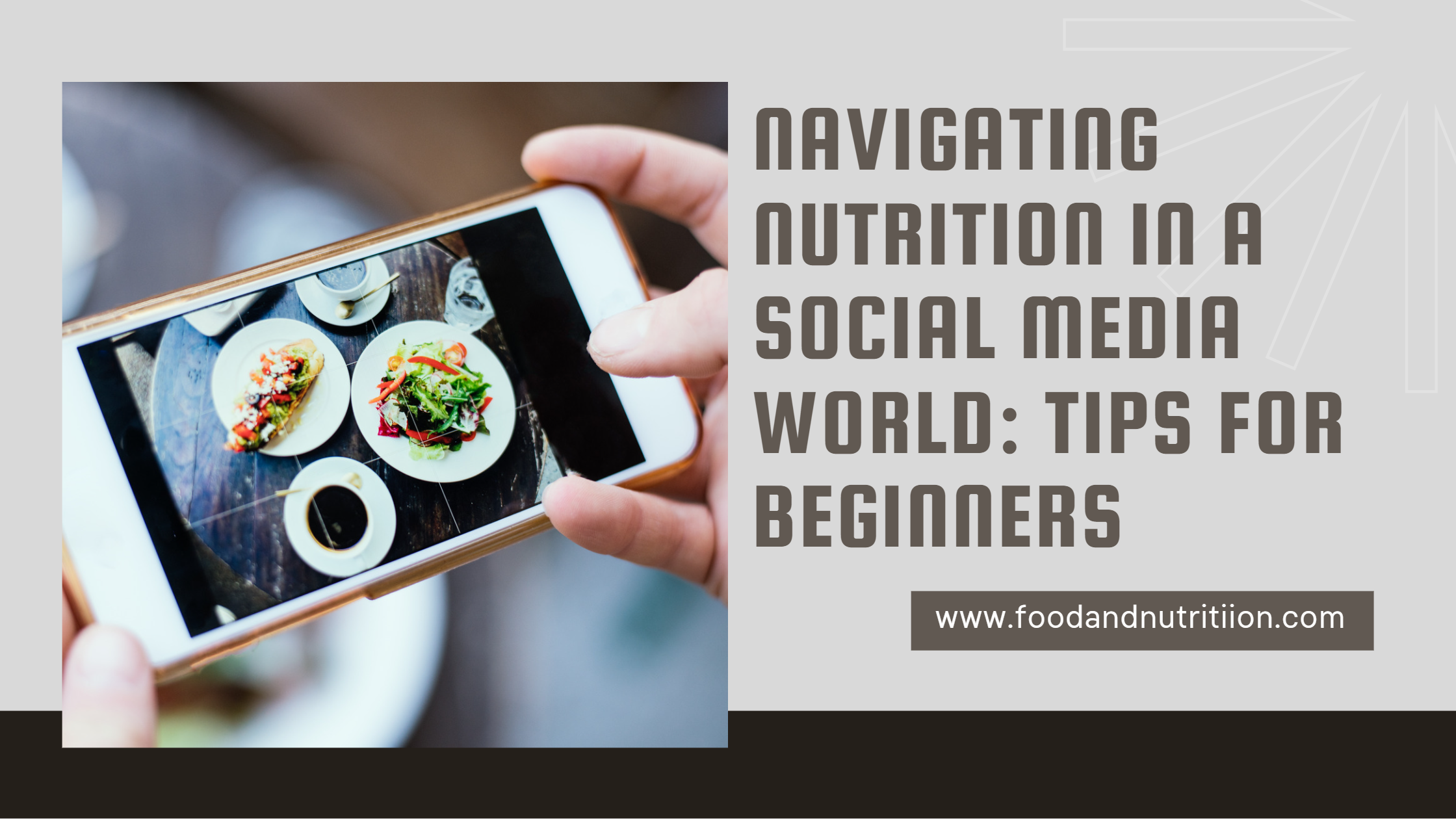Navigating Nutrition in a Social Media World: Tips for Beginners

In today’s social media world, food has become a popular topic. Instagram, TikTok, and other social media platforms are full of pictures and videos of delicious foods, recipes, and diet plans. But, how much do we really know about nutrition? With so much conflicting information available online, it can be challenging to know what to believe. In this essay, we will explore the basics of nutrition and the role that social media and advertising play in our food choices. We will also provide some tips on how to have a positive image of food and nutrition.
What is Nutrition?
Nutrition is the science of how the body uses food to function. Food provides our bodies with energy, building blocks for growth and repair, and essential nutrients that we cannot make ourselves. Nutrients include carbohydrates, proteins, fats, vitamins, and minerals. Each nutrient plays a unique role in the body, and a balanced diet is essential for good health.
Carbohydrates are the body’s primary source of energy, and they come in two forms: simple and complex. Simple carbohydrates are found in foods such as sugar, honey, and fruit, while complex carbohydrates are found in foods such as whole grains, vegetables, and legumes.
Proteins are essential for growth and repair in the body, and they are found in foods such as meat, fish, poultry, beans, and nuts.
Fats are important for energy storage, insulation, and protecting organs. There are two types of fats: saturated and unsaturated. Saturated fats are found in foods such as butter, cheese, and fatty meats, while unsaturated fats are found in foods such as avocados, nuts, and fish.
Vitamins and minerals are essential for the body to function properly. Vitamins are organic compounds that the body needs in small amounts to maintain good health, while minerals are inorganic substances that the body needs in small amounts for various functions.
The Role of Social Media and Advertising on Food Choices
Social media and advertising have a significant impact on our food choices. With the rise of social media platforms, food bloggers and influencers have become increasingly popular. These individuals often post pictures and videos of delicious and visually appealing foods, which can influence our cravings and desire for certain foods.
Advertising also plays a significant role in our food choices. Companies spend millions of dollars on advertising campaigns to promote their products. They use clever marketing tactics to make their products appear healthier and more desirable than they really are. For example, a food product may be labeled as “low fat,” “all-natural,” or “organic,” even though it may contain high amounts of sugar or unhealthy additives.
Tips for Developing a Positive Image of Food and Nutrition
Despite the impact of social media and advertising on our food choices, it is possible to develop a positive image of food and nutrition. Here are some tips to get started:
- Focus on whole, nutrient-dense foods: Whole, nutrient-dense foods provide our bodies with the essential nutrients that we need to function properly. Choose foods such as fruits, vegetables, whole grains, lean proteins, and healthy fats. These foods will help you feel full and satisfied, and they will provide your body with the energy and nutrients it needs to function properly.
- Limit processed and packaged foods: Processed and packaged foods are often high in sugar, unhealthy fats, and sodium. These foods provide little nutritional value and can lead to weight gain, inflammation, and other health problems. Try to limit your intake of these foods and focus on whole, nutrient-dense options instead.
- Educate yourself: With so much conflicting information available online, it can be challenging to know what to believe. Educate yourself about nutrition by reading credible sources such as government websites, academic journals, and books written by qualified nutrition experts. Be wary of sources that promote extreme diets or make unrealistic claims about certain foods or supplements.
- Practice mindful eating: Mindful eating involves paying attention to your body’s hunger and fullness cues, and savoring the flavors, textures, and aromas of your food. This can help you enjoy your food more and prevent overeating.
- Don’t compare yourself to others: Social media can create unrealistic expectations about what we should eat and how our bodies should look. Remember that everyone’s nutritional needs are different, and there is no one-size-fits-all approach to healthy eating. Focus on your own health and wellbeing, and don’t compare yourself to others.
- Seek support: Changing your eating habits can be challenging, but it is easier when you have support. Seek out a qualified nutritionist, join a support group, or enlist the help of a friend or family member who shares your goals.
Nutrition is a complex and ever-evolving science, and the role of social media and advertising on our food choices cannot be ignored. However, by focusing on whole, nutrient-dense foods, limiting processed and packaged foods, educating ourselves, practicing mindful eating, avoiding comparisons, and seeking support, we can develop a positive image of food and nutrition that supports our overall health and wellbeing. Remember, healthy eating is not about perfection, but rather progress. Small, sustainable changes over time can lead to significant improvements in our health and quality of life.
- Eating Your Way to Healthy Blood Pressure: A Guide to Lowering Hypertension
- Unlock the Flavor: The Ultimate Guide to Cooking Salts
- Hydration Mastery for Athletes: Track & Field Performance Boost
- Salt & Heart Health: Unveiling the Truth Behind Sodium Intake
- Boost Immunity with Nordic Diet: A Guide for Healthier Living
- Tackling Obesity: Practical Strategies for Healthier Lives